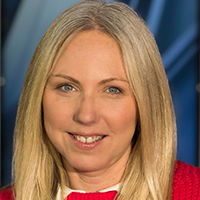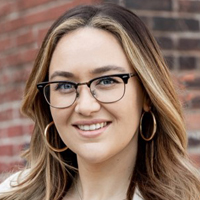
TVN’s Women To Watch Channel Listening Into Action

The confidence to ask questions and ability to listen have propelled the careers of three women who have contributed toward technologically advancing the media industry.
Emily Stone, VP for digital content and LiveNOW for Fox Television Stations, Hannah Barnhardt, COO of TMT Insights, and Nadia Khan, chief marketing officer at LTN, are TVNewsCheck’s Women in Technology Women To Watch. They will be recognized in a reception at the NAB Show in Las Vegas on April 18.
Stone Keeps User Experience Top Of Mind

Emily Stone
Emily Stone, who oversaw the overhaul of Fox Television Stations’ websites and apps and now includes the LiveNOW FAST channel in her portfolio for Fox, started with the company as an intern.
After briefly fantasizing about being a vet — which would have required doing math and dealing with blood, she notes with chagrin — Stone gave herself to journalism. She landed an internship in the sports department. At the time, the station had a website, but “it was a terrible user experience” that only had three stories per page on the news, sports and weather pages, she says. “It was my job to put in three stories a day.”
Upon graduation, the news director offered her a position as a web producer.
“I asked, ‘What is that?’ and he said, ‘I have no idea, you’ll figure it out,’” she recalls.
And she did.
Now she leads all the digital teams at Fox in addition to heading up LiveNOW.
“My background is all content,” Stone says. “My relationship with technology is very different than some of my colleagues.”
What she does know is that digital content needs great technology to support it, and vice versa.
“You don’t have a great user experience on your product if you don’t have great content, and you can’t share it without a great tool,” she says.
Those tools are evolving all the time, she says, and as such the industry needs to be flexible.
People can’t be “stuck in ‘this is how we’ve always done things.’ If that’s your mentality, especially on the streaming side of things, that’s not going to work,” she adds. “It’s a tough lesson to learn.”
LiveNow, for instance, evolved to meet the needs of streaming viewers.
LiveNOW is “focused on being live right now and what is happening in the world live right now,” she says. Based in Orlando and Phoenix, “We’re always live, raw and unfiltered” with limited commentary and no opinion.
It started as a test project at a single station several years ago. Now it airs 19 hours a day on weekdays and is hiring more personnel.
“LiveNOW is unique because it is created for streaming” and is not repurposed content, she says. “LiveNOW depends on the technology that supports it.”
Stone, a sports fan and self-proclaimed “crazy dog mom,” says during her career she has tried to learn everything she absolutely could, asked questions and been engaged with what’s around her.
“I ask people questions all the time,” Stone says. “Just because you’re in charge, you’re not meant to know everything.”
Barnhardt Buttresses Media Supply Chain

Hannah Barnhardt
Hannah Barnhardt developed a platform that supports the media supply chain for content creators. TMT Insights, which she co-founded in 2020 with CEO Andy Shenkler, helps accelerate technologies and make them more accessible for broadcasters, content owners and vendors, she says.
“Our clients range from small businesses such as post houses in Burbank all the way up to major corporations like NBCUniversal and Sky in the U.K.,” she says.
She says her ability to look at the big picture helps her provide TMT’s clients with better solutions. She aims to pull in multiple perspectives to help companies transform the way they manage their businesses, she says.
“Overarching strategy has always been something I’ve had personal interest in, as well as tactical,” she says. “I’ve always prided myself on being able to take a step back, to look at the goal from each silo and pull together those voices to make sure that it’s successful.”
Part of that happens through “immersing ourselves with clients” to become an extension of their team, says Barnhardt, who enjoys spending time with her dog and cooking. Through such an effort she says, it’s possible to see that the company’s client may “have all the ingredients in front of them, but they don’t know how to prepare it, or may not know what dish they can make. We can help, show them, ‘This is what you can make,’ show them how long it will take,” and they’ll wind up with something with a “complex flavor.”
She partly attributes her success to her comfort with asking questions.
For instance, if there’s a highly technical conversation going on, she’ll say, “’I’m not a software developer or solutions architect.’ I think being able to raise my hand in a group of people and not being ashamed to say, ‘I don’t know what you’re talking about, could you please re-explain it?’” shows her openness to learning. After all, she says, “We all bring our own strengths and abilities. We’re all there for a reason.”
And it’s a behavior she models for her team.
“The worst thing you could do is sit quietly or walk away with a task on your plate that you don’t feel like you have the skills to execute on your own. Don’t sit idle. Raise your hand. Ask a question,” she says.
Sometimes asking questions means asking for an opportunity, Barnhardt says. At one point in her early career, when she was at Sony and the company was building out its OTT platform and considering a move to the AWS cloud, she asked if she could participate in the meetings and get a first-hand view of how to craft a strategic partnership.
“That gave me the opportunity to look at different levels of technology and starting to grow my skill set,” she says.
Khan Builds A Brand Foundation

Nadia Khan
Nadia Khan developed LTN’s marketing plan and helped position the company as an important technology provider to the media industry.
When she joined, the company had never had a dedicated marketing team, so she spent her first year with LTN establishing the brand and creating a foundation for the work she did in the next few years on the job. Part of that entailed bringing new companies into the LTN brand.
“A year into building the brand, I had to expand the portfolio and absorb four companies in a rapid-fire way,” she says. “Marketing has become a key part of our organization in terms of revenue generation.”
One of the things that helps, she says, it that LTN has a “premium product that really does sell itself.”
Even so, she enjoys marketing, which she says is a natural fit for her.
“It links strategy and emotion, which I really like,” Khan says. “People don’t make completely objective decisions, even in B2B.”
Her job combines data analysis and the human element.
“I bridge the gap between data and storytelling, taking inputs and creating a story out of that, building a customer profile, understanding somebody’s needs,” she says.
One of the critical skills that has helped her succeed is being able to listen, she says.
“Particularly in marketing, but in any kind of function, the art of listening can take you very far. Their needs, what they’re saying, being able to read between the lines of what they’re not saying,” she says. “I allow people to feel like they are heard, even if they’re not the loudest voice in the room.”
But marketing technology is about more than listening, she says. It’s about understanding that different functions within an organization “almost speak different languages” and that their expectations may differ.
“The key thing in marketing is the importance of translating that into the specific language that is relevant to the function you’re speaking to,” she says. “When I speak to my team, I speak in marketing language. When I speak to leadership, I focus on data, revenue and results.”
And as the industry continues through its digital transformation, she says, it’s important to “bring everyone along with you and ensure there’s a place in the future for them. It’s important to be able to speak all those different languages.”
Read more about this year’s Women in Technology Awards here.
































Comments (0)